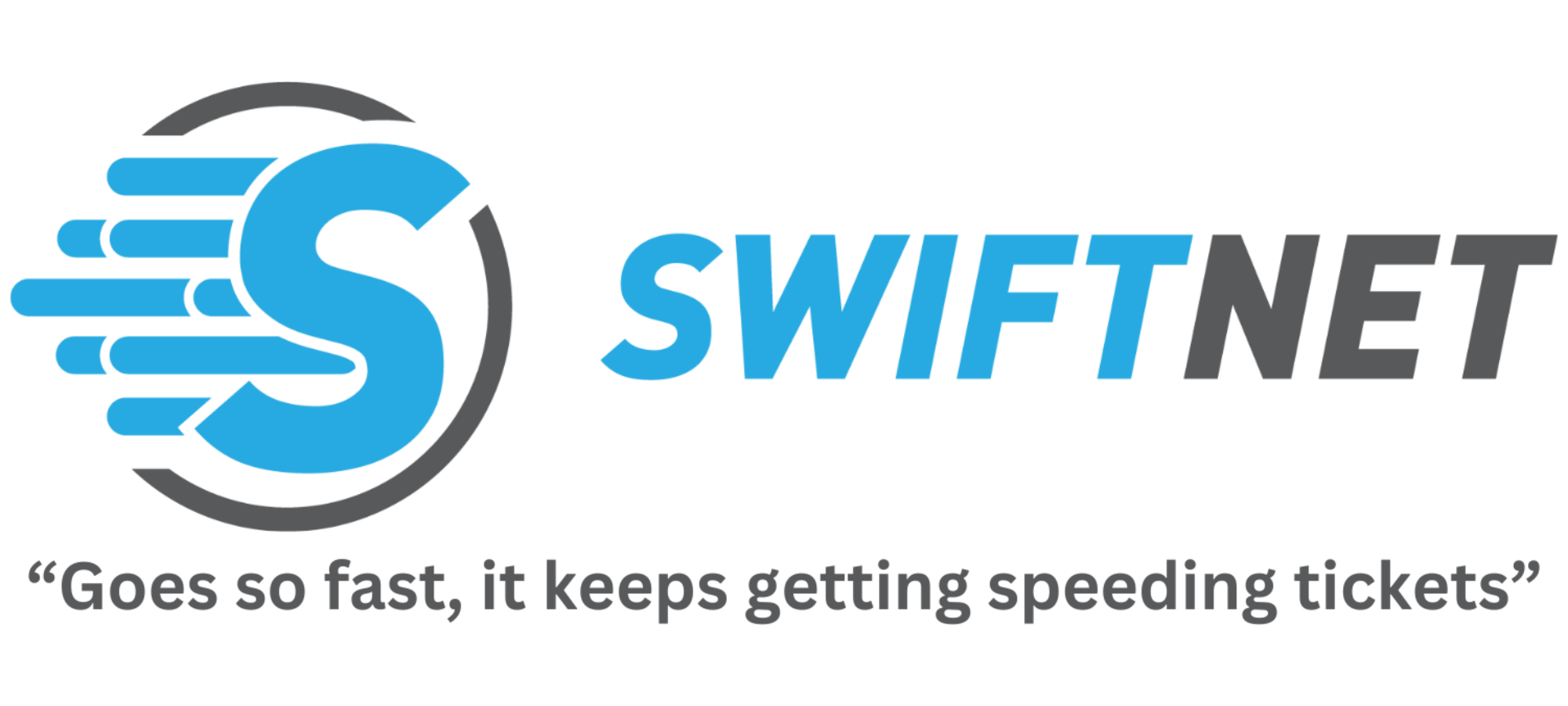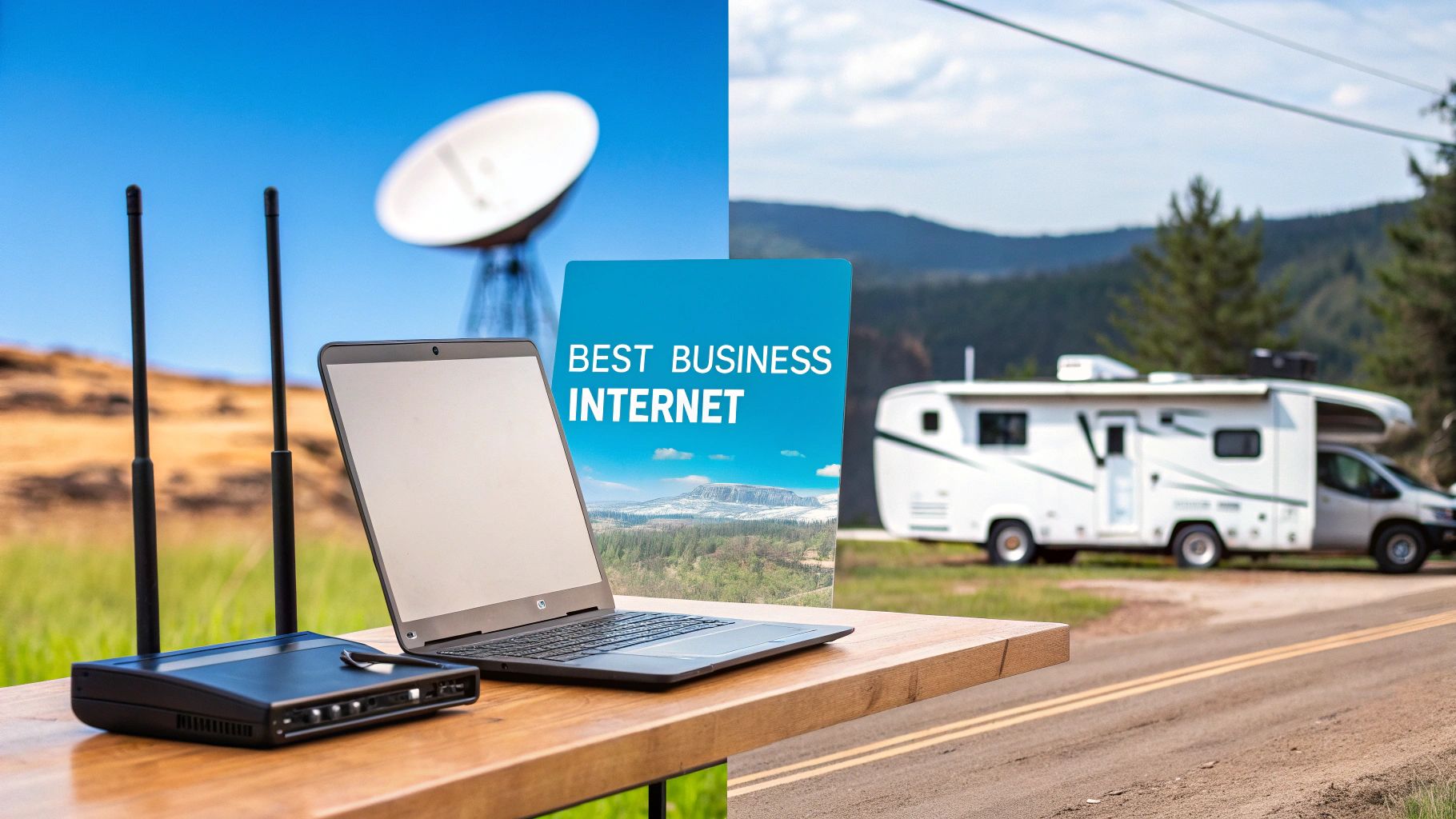

· By James
12 Best Business Internet Providers for 2025 (In-Depth)
In today's economy, a reliable internet connection is the backbone of your operations. From processing payments and managing cloud data to connecting with a remote workforce, your internet service is non-negotiable. However, the market is saturated with options, each claiming to offer the best speed or most dependable connection. This guide is designed to cut through the marketing noise and deliver clear, actionable insights.
This comprehensive resource provides an in-depth, comparative analysis of the best business internet providers available today. We’ll break down the critical factors: upload and download speeds, real-world reliability, hidden fees, and the fine print in contracts. Whether you're running an urban office, a rural enterprise far from fiber lines, or a mobile company from an RV, we have you covered. The right choice depends entirely on your unique operational needs. For instance, whether you're opening a physical office or considering starting a detailing business, a robust digital lifeline is paramount for day-to-day operations and growth.
In the list below, you will find a detailed review of each provider, including:
- Honest pros and cons based on actual user experiences.
- Specific use-case scenarios to see which service fits your business model.
- Direct links and screenshots to help you explore each option further.
We’ve done the heavy lifting to help you find a business internet provider that not only meets your current demands but also supports your future ambitions. Let's dive into the top contenders, including major players like AT&T and Verizon, alongside specialized options like Viasat for rural locations and innovative solutions like SwiftNet Wifi for those on the move.
1. SwiftNet Wifi
SwiftNet Wifi emerges as a powerful and highly specialized solution, earning its place as one of the best business internet providers, particularly for a modern, mobile workforce. It directly addresses the critical connectivity gap faced by businesses operating outside traditional infrastructure, such as those in rural areas or with teams that travel extensively in RVs. By harnessing the power of 5G cellular networks, SwiftNet delivers high-speed, reliable internet where fiber optic cables can't reach. This focus on underserved markets makes it an indispensable tool for remote workers, digital nomads, and any enterprise that demands consistent performance in unconventional locations.
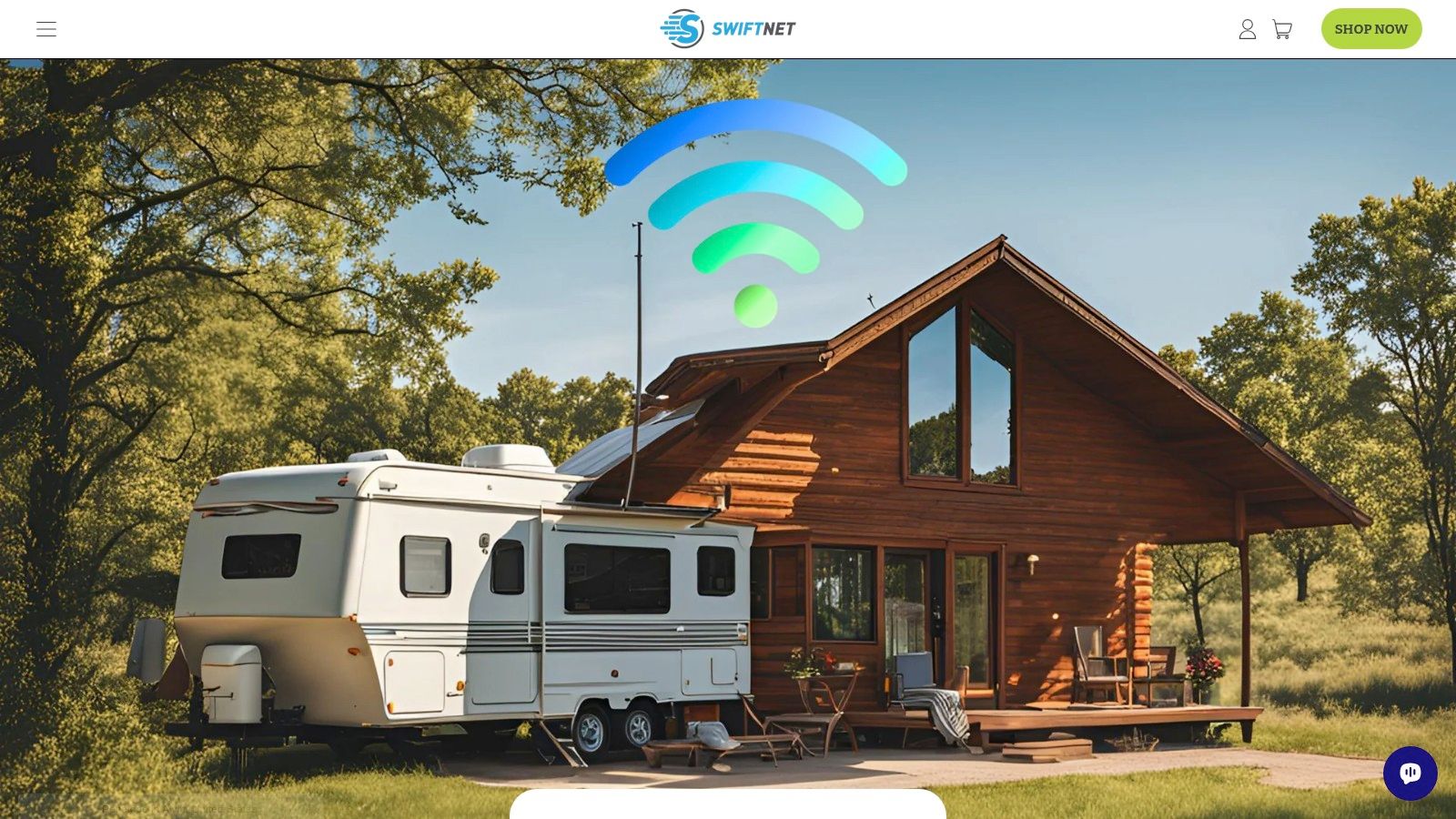
Unlike conventional ISPs that are geographically constrained, SwiftNet Wifi offers a level of operational freedom that is increasingly vital. For a business, this means a field team can confidently conduct video conferences from a remote worksite or an RV-based entrepreneur can manage e-commerce operations seamlessly from a national park campground. The service is engineered to provide the bandwidth necessary for data-intensive tasks like HD video streaming, large file transfers, and using cloud-based business applications without frustrating lag.
Key Strengths & Use Cases
SwiftNet Wifi's primary advantage is its ability to transform a 5G signal into a stable, robust Wi-Fi network. This makes it a superior alternative to relying solely on a mobile hotspot, which often struggles with multiple device connections and consistent throughput.
- For Rural Businesses: A small business, farm, or workshop located outside of a town's fiber zone can establish a professional-grade internet connection for processing orders, managing inventory, and communicating with clients.
- For Mobile Professionals & RV Fleets: Consultants, photographers, or construction managers who travel frequently can maintain a dedicated, secure office network on the go. This ensures productivity isn't dictated by the spotty Wi-Fi at hotels or coffee shops.
- Pop-Up Operations: Companies running temporary operations like event booths, seasonal retail locations, or remote project sites can deploy instant, reliable internet without complex installation.
Service & Implementation
While SwiftNet Wifi doesn't publicly list its pricing, requiring a direct inquiry allows them to tailor solutions based on a user's specific location and needs. This bespoke approach ensures customers get the right plan for their usage patterns. The setup is designed for user-friendliness, mirroring the plug-and-play simplicity of home routers. For those considering a permanent or semi-permanent setup, SwiftNet provides guidance on optimizing the connection, a topic they explore in-depth for users wanting to replace their home internet with a dedicated hotspot solution.
Pros:
- Provides high-speed 5G internet in rural and remote areas.
- Specifically engineered for RV travelers and mobile professionals.
- Enables reliable online work, streaming, and communications on the move.
- Fills a critical gap where traditional ISPs have limited or no coverage.
Cons:
- Pricing details require direct contact, preventing easy upfront comparison.
- Service performance is contingent on 5G network availability at the specific location.
2. AT&T Business
AT&T Business secures its spot as one of the best business internet providers, particularly for companies operating within its extensive fiber network. The website, att.com/business, is a straightforward portal for exploring plans, checking service availability, and managing accounts. Its standout feature is the promotion of symmetrical fiber speeds, reaching up to an impressive 5 Gbps.
This symmetry is a game-changer for businesses that regularly upload large files, host servers, or rely on crystal-clear video conferencing. While many providers focus on download speed, AT&T's equal upload and download capabilities support data-intensive operations without bottlenecks. This makes it an exceptional choice for creative agencies, tech startups, and remote teams collaborating on large-scale projects. Their website clearly lays out pricing tiers and features, including the AT&T ActiveArmor security suite and a 99.9% uptime guarantee.
Key Offerings and User Experience
Navigating the AT&T Business site is relatively simple. The most crucial first step is using the address lookup tool to confirm fiber availability, as this is their primary strength but also their main limitation.
Pros:
- High-Performance Fiber: Symmetrical speeds are ideal for demanding digital workloads.
- Flexible Contracts: Many fiber plans come without restrictive annual contracts, offering valuable flexibility.
- Strong Reliability: The 99.9% uptime promise provides peace of mind for mission-critical operations.
Cons:
- Limited Fiber Footprint: Availability is restricted to 23 states, making it inaccessible for many rural or out-of-network businesses.
- Premium Pricing: Costs can be higher compared to cable or 5G internet alternatives.
For businesses weighing their options, understanding the core differences between technologies is crucial. For an in-depth analysis, you can explore the debate between 5G and fiber internet to see which fits your specific needs. If you are within AT&T's fiber zone, it represents a top-tier, reliable solution.
3. Verizon Business
Verizon Business establishes itself as a top-tier choice among the best business internet providers, especially for companies that can leverage its powerful Fios fiber network or its industry-leading 5G wireless internet. The website, verizon.com/business, serves as a comprehensive hub for exploring these diverse connectivity options, from symmetrical fiber speeds up to 940 Mbps to flexible 5G plans. Verizon's key differentiator is its dual-pronged approach, offering both premier fixed-line fiber and robust wireless solutions.
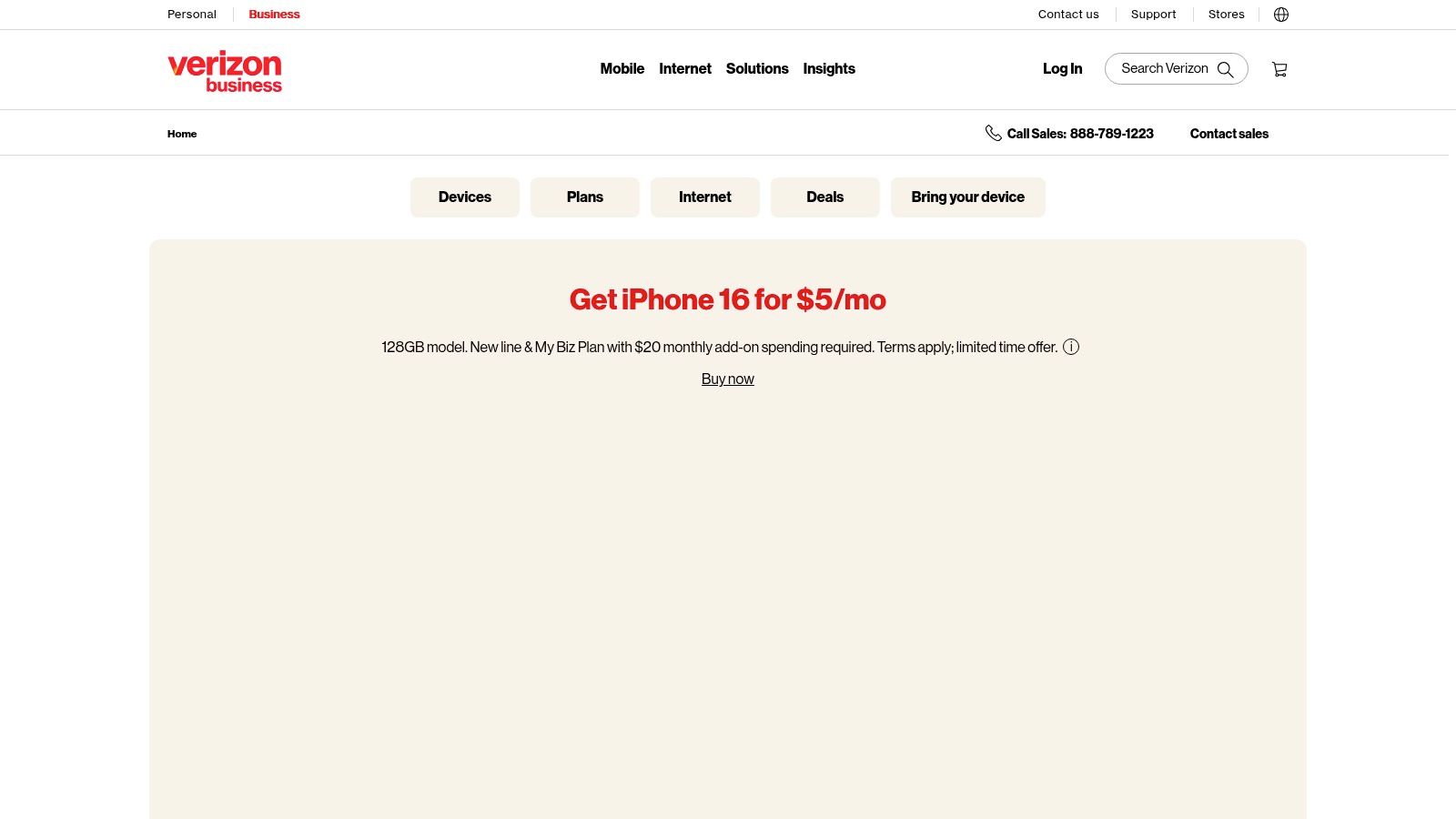
This flexibility makes Verizon particularly appealing. Businesses within its fiber footprint benefit from the reliability and speed needed for data-heavy tasks, while those in rural or developing areas can access high-speed internet through its expansive 5G network. This is a significant advantage for mobile businesses, remote teams in areas without cable, and even RV travelers who need consistent connectivity on the go. The website clearly outlines its plans, often including incentives like contract buyouts to ease the transition from another provider.
Key Offerings and User Experience
The Verizon Business website efficiently guides users to the right solution. The address checker is the critical first step, immediately clarifying whether you qualify for its acclaimed Fios fiber or its versatile 5G Business Internet.
Pros:
- Leading 5G Technology: Offers a strong, viable high-speed internet alternative for businesses outside of traditional fiber or cable zones.
- Reliable Fiber Network: Symmetrical Fios speeds provide dependable performance for demanding digital operations.
- Strong Customer Support: Verizon is known for its 24/7 customer service and high satisfaction ratings.
Cons:
- Limited Fios Availability: The high-performance fiber service is concentrated primarily in the Northeast United States.
- Contract Requirements: Some of the most attractive plans and promotions may require a long-term service agreement.
For businesses deciding between technologies, it's vital to assess your specific operational needs. For those without access to fiber, understanding how 5G compares to other wireless options is key. You can read a detailed comparison of 5G and satellite internet to determine the best fit. If your business falls within Verizon's service area, its blend of performance and technological innovation makes it a formidable contender.
4. Comcast Business
Comcast Business stands as a powerhouse among the best business internet providers, leveraging its vast cable network to deliver high-speed, reliable connectivity. The website, business.comcast.com, serves as an efficient hub for exploring a wide array of service tiers, including impressive cable speeds up to 1.25 Gbps. Its key differentiator is offering enterprise-grade speed and features over a widely available cable infrastructure, making it an accessible option for businesses outside major fiber zones.
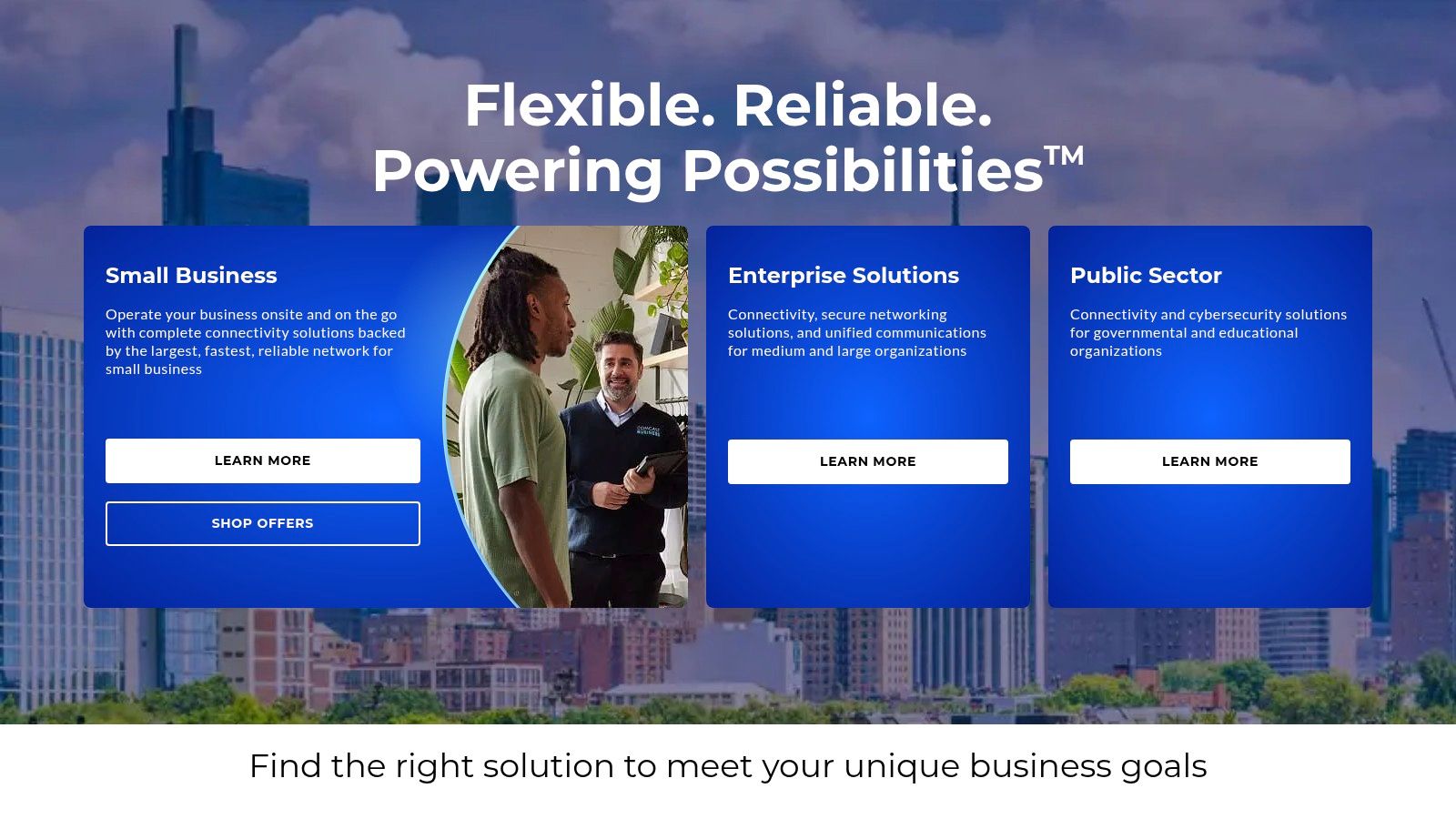
This high-speed capability is crucial for businesses with significant bandwidth needs, such as streaming high-definition content, managing large data transfers, or supporting dozens of connected devices simultaneously. The website clearly outlines its plans, which often include unlimited data, 24/7 priority support, and valuable add-ons like wireless backup to ensure continuity during an outage. This makes it a strong contender for retail stores, professional offices, and remote teams needing dependable performance without fiber availability.
Key Offerings and User Experience
The Comcast Business website is designed for clarity, with an address verification tool prominently featured to quickly confirm serviceability. The platform effectively showcases its multi-layered offerings, from basic internet to comprehensive bundles with voice and security.
Pros:
- Widespread High Speeds: Offers gigabit-level speeds across an extensive national cable network.
- Robust Feature Set: Plans include unlimited data, cybersecurity features, and options for automatic 4G LTE backup.
- Dedicated Support: Business customers receive priority 24/7 support, minimizing potential downtime.
Cons:
- Contract Requirements: Most competitive pricing is locked behind a two-year service agreement.
- Higher Costs: Can be more expensive than residential plans or some emerging 5G alternatives.
For businesses that demand high-speed, reliable internet but are not located in a fiber-optic service area, Comcast Business provides a powerful and widely accessible solution.
5. Spectrum Business
Spectrum Business stands out as a highly accessible option for companies seeking reliable internet without long-term commitments. Its website, spectrum.com/business, serves as a direct portal for exploring its cable internet services, which are available across a vast 41-state network. The platform's major draw is its straightforward, no-contract policy, offering speeds up to 1 Gbps.
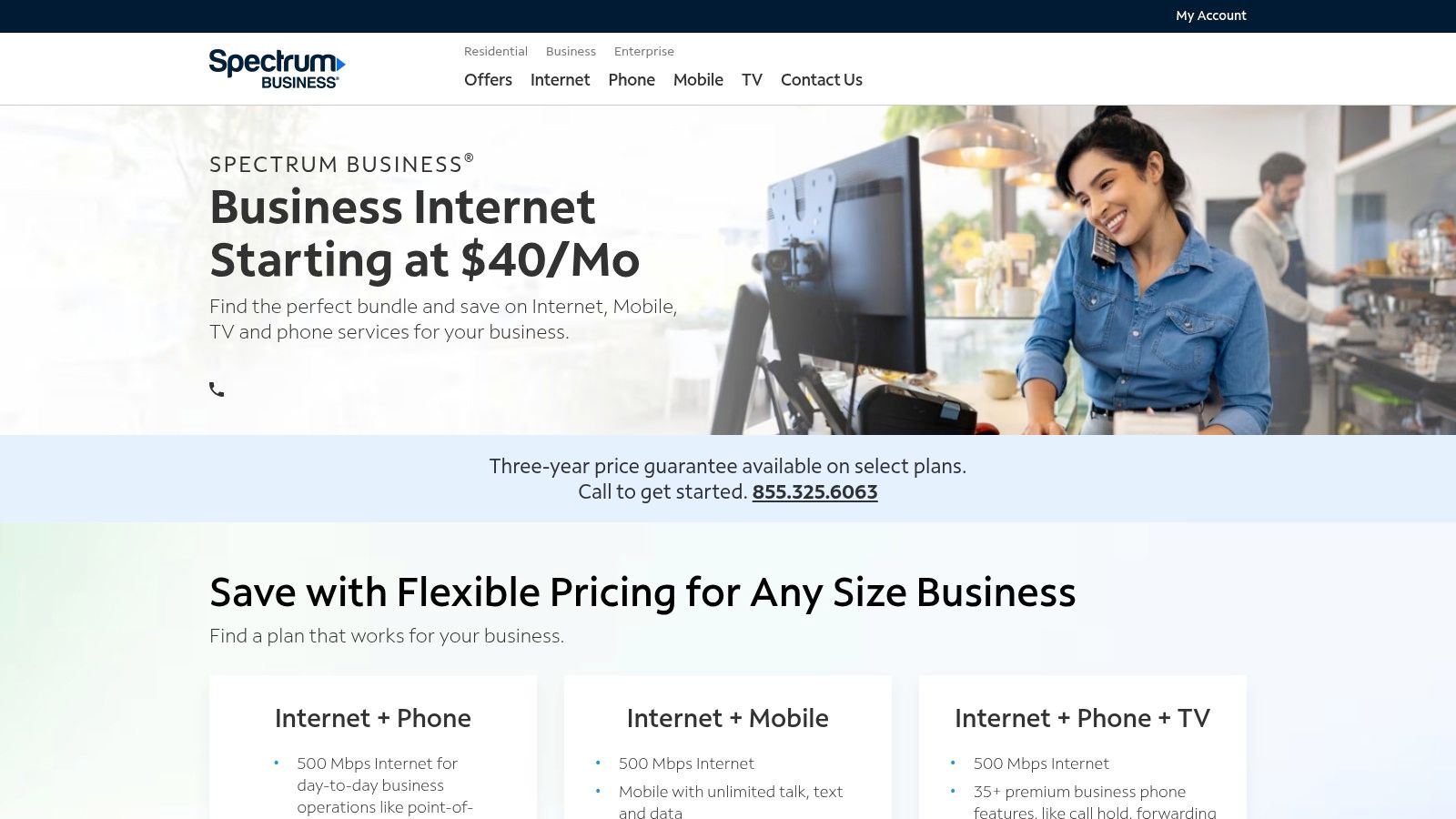
This flexibility is invaluable for small to mid-sized businesses, startups, and remote workers who need robust internet without being locked into annual agreements. Spectrum's widespread availability makes it a prime candidate for businesses in suburban and even some rural areas where fiber is not yet present. The website clearly presents bundled options, allowing users to combine internet with phone and TV services for an all-in-one solution, and offers a wireless internet backup to ensure connectivity during an outage.
Key Offerings and User Experience
The Spectrum Business website is designed for efficiency. A prominent address checker is the first step, immediately confirming serviceability and displaying the plans available at that specific location. This streamlines the decision-making process for potential customers.
Pros:
- Flexible, No-Contract Options: Provides businesses the freedom to adapt their services without termination fees.
- Wide Availability: Its extensive cable network covers 41 states, making it one of the most accessible providers.
- Bundled Services: Offers comprehensive solutions by packaging internet with business phone and TV.
Cons:
- Service Quality Varies: Performance and reliability can differ significantly depending on regional infrastructure.
- Higher Prices for Speed: The fastest gigabit-speed plans come at a premium compared to entry-level tiers.
For many businesses operating outside major fiber hubs, Spectrum Business provides a powerful and flexible internet solution. Its combination of broad coverage and no-contract plans makes it one of the best business internet providers for companies that prioritize adaptability and widespread access.
6. EarthLink Business
EarthLink Business makes its mark as one of the best business internet providers by focusing on transparency and customer satisfaction. The website, earthlink.net/business, provides a clear path for businesses to explore fiber internet plans with symmetrical speeds up to 5 Gbps. Its primary differentiator is a commitment to straightforward, affordable pricing without hidden fees or promotional rate hikes, a common frustration for many commercial customers.
This focus on transparent value makes EarthLink an attractive option for small to medium-sized businesses that need predictable monthly expenses without sacrificing performance. The absence of data caps ensures that operations like constant cloud backups, video streaming, or running a public Wi-Fi network won't result in surprise overage charges. The site emphasizes its high customer satisfaction ratings, positioning itself as a reliable partner rather than just a utility provider.
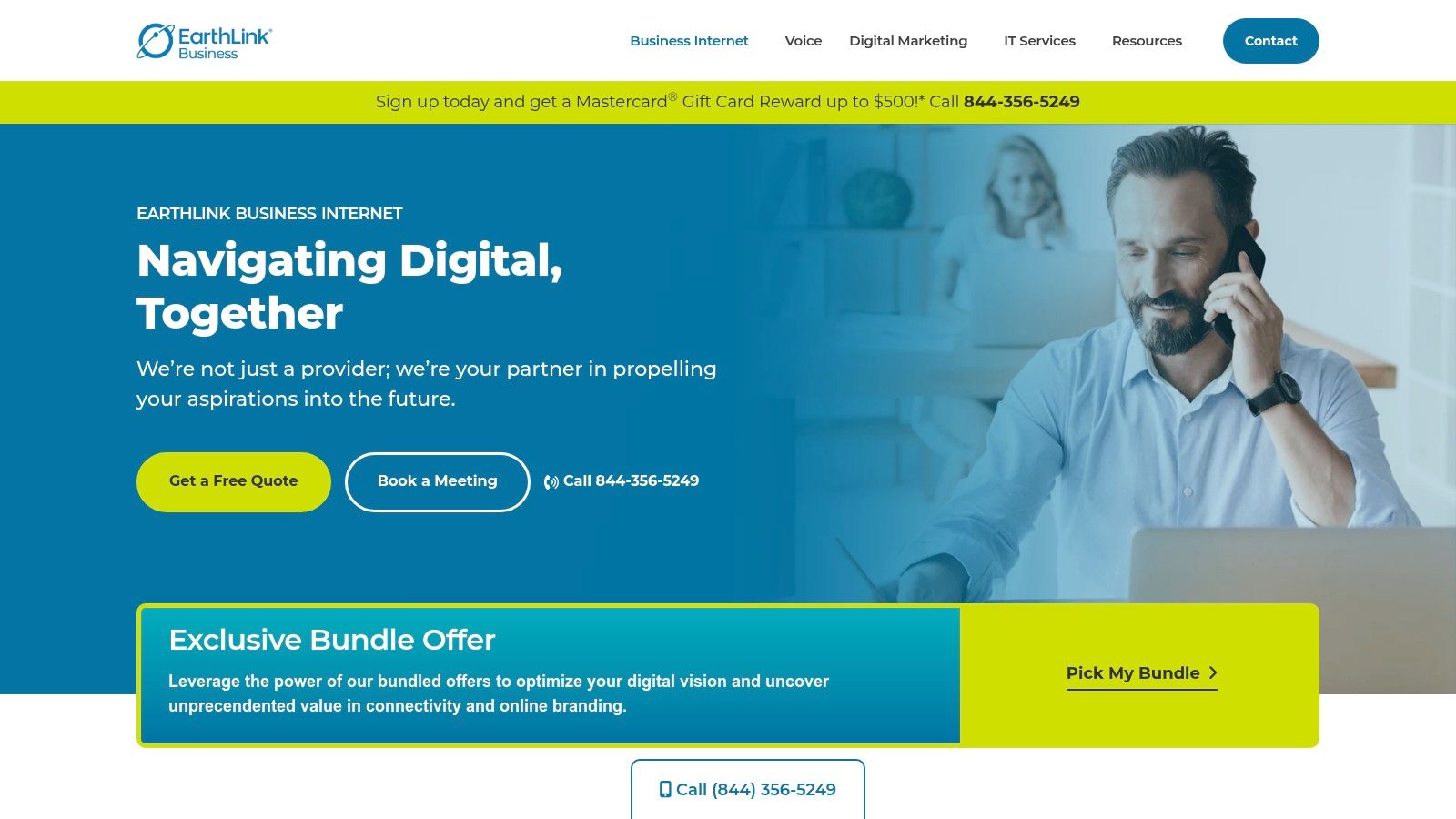
Key Offerings and User Experience
The EarthLink Business website is designed for simplicity, allowing users to quickly check for service availability in their area. This is a critical first step, as their fiber network, while powerful, is not as widespread as some larger competitors.
Pros:
- Transparent Pricing: No hidden fees and a promise of no surprise rate increases provide budget stability.
- High Customer Satisfaction: A strong focus on the customer experience helps build trust and reliability.
- Affordable High-Speed Plans: Offers competitive pricing for fiber speeds, making high-end performance accessible.
Cons:
- Limited Coverage: The service footprint is smaller than national carriers, restricting availability.
- 12-Month Contract Required: Unlike some providers offering month-to-month plans, EarthLink requires an annual commitment.
For businesses operating in an EarthLink service area, the combination of high-speed fiber, clear pricing, and a customer-first approach presents a compelling package. It is an excellent choice for companies prioritizing long-term budget predictability and dependable service.
7. Frontier Business
Frontier Business carves out its niche among the best business internet providers by offering aggressive pricing on high-speed fiber plans, particularly for small to medium-sized enterprises. The website, business.frontier.com, serves as a direct portal to explore multi-gigabit speeds and check for service availability. Its most compelling draw is providing powerful fiber internet up to 7 Gbps without locking businesses into restrictive annual contracts.
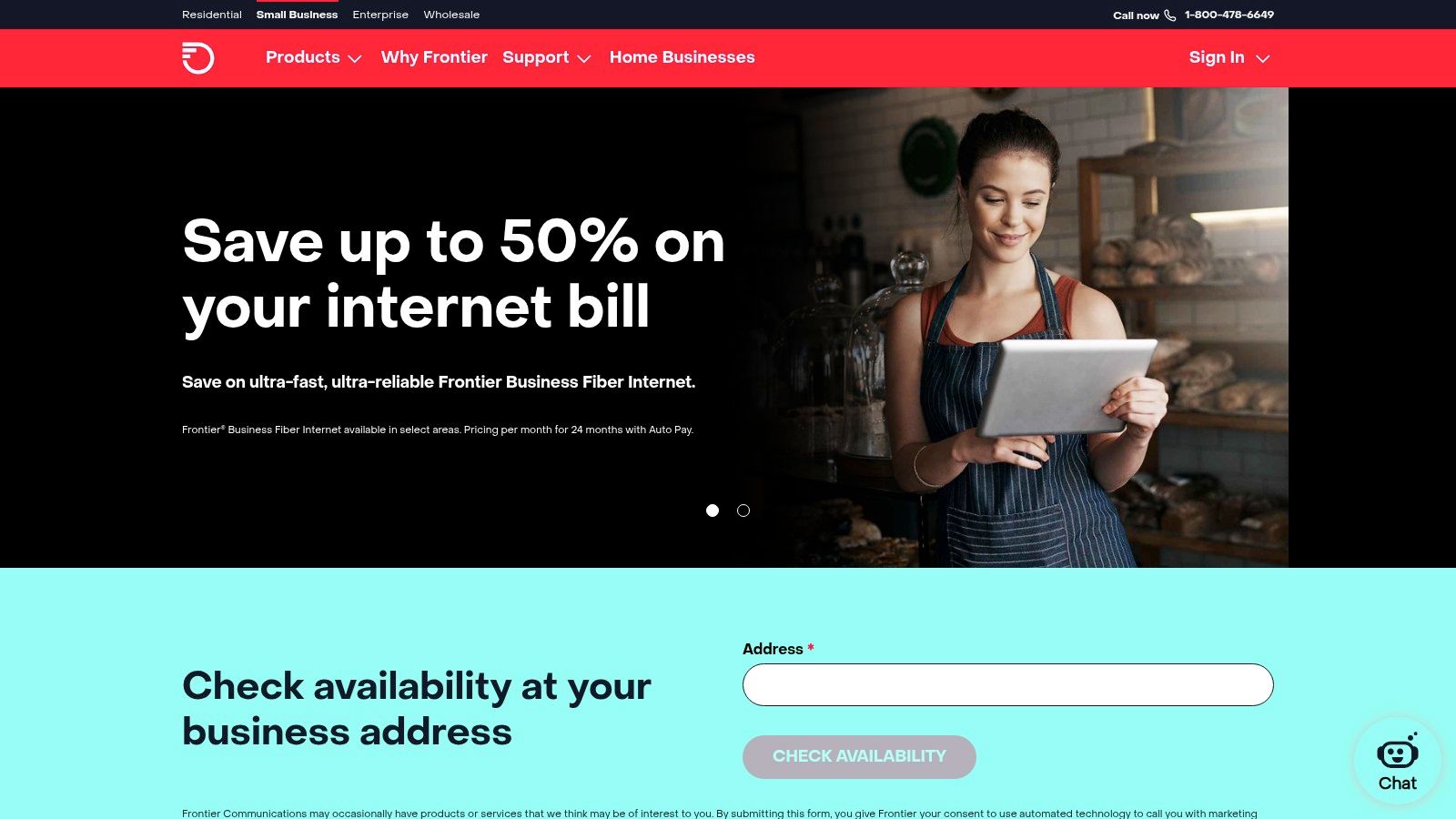
This contract-free approach offers significant flexibility, a major advantage for startups or companies in dynamic markets that need to adapt quickly without facing early termination fees. Frontier's inclusion of a free router with its plans simplifies the setup process and reduces initial costs. This makes it an attractive option for budget-conscious businesses that still require top-tier performance for data-heavy tasks, cloud-based applications, and seamless team collaboration.
Key Offerings and User Experience
The Frontier Business website is centered around its address qualification tool, which is the necessary first step to determine if its growing fiber network serves your location. The site clearly outlines its speed tiers and straightforward pricing.
Pros:
- High-Speed Options: Symmetrical fiber speeds reaching up to 7 Gbps support extremely demanding digital operations.
- No Annual Contract: Offers valuable flexibility, allowing businesses to change or cancel service without penalty.
- Included Equipment: A provided router eliminates the need for an additional hardware purchase, simplifying setup.
Cons:
- Limited Availability: Frontier's fiber network is still expanding, making it unavailable to many businesses, especially in rural areas not yet upgraded.
- Inconsistent Customer Service: Customer support ratings can be mixed, which may be a concern for businesses needing immediate, reliable assistance.
For businesses located within Frontier's fiber footprint, the combination of high-speed performance and contract flexibility presents a powerful value proposition. However, potential customers should verify service quality reports in their specific region.
8. CenturyLink Business
CenturyLink Business carves out its niche as one of the best business internet providers by focusing on affordability and flexibility, especially appealing to small businesses and those in areas with mixed connectivity options. The website, centurylink.com/business, serves as a direct portal for businesses to explore DSL and fiber plans, with a strong emphasis on straightforward, no-hassle service. Its most notable feature is the commitment to no annual contracts, which is a significant advantage for startups or businesses hesitant to commit to long-term agreements.
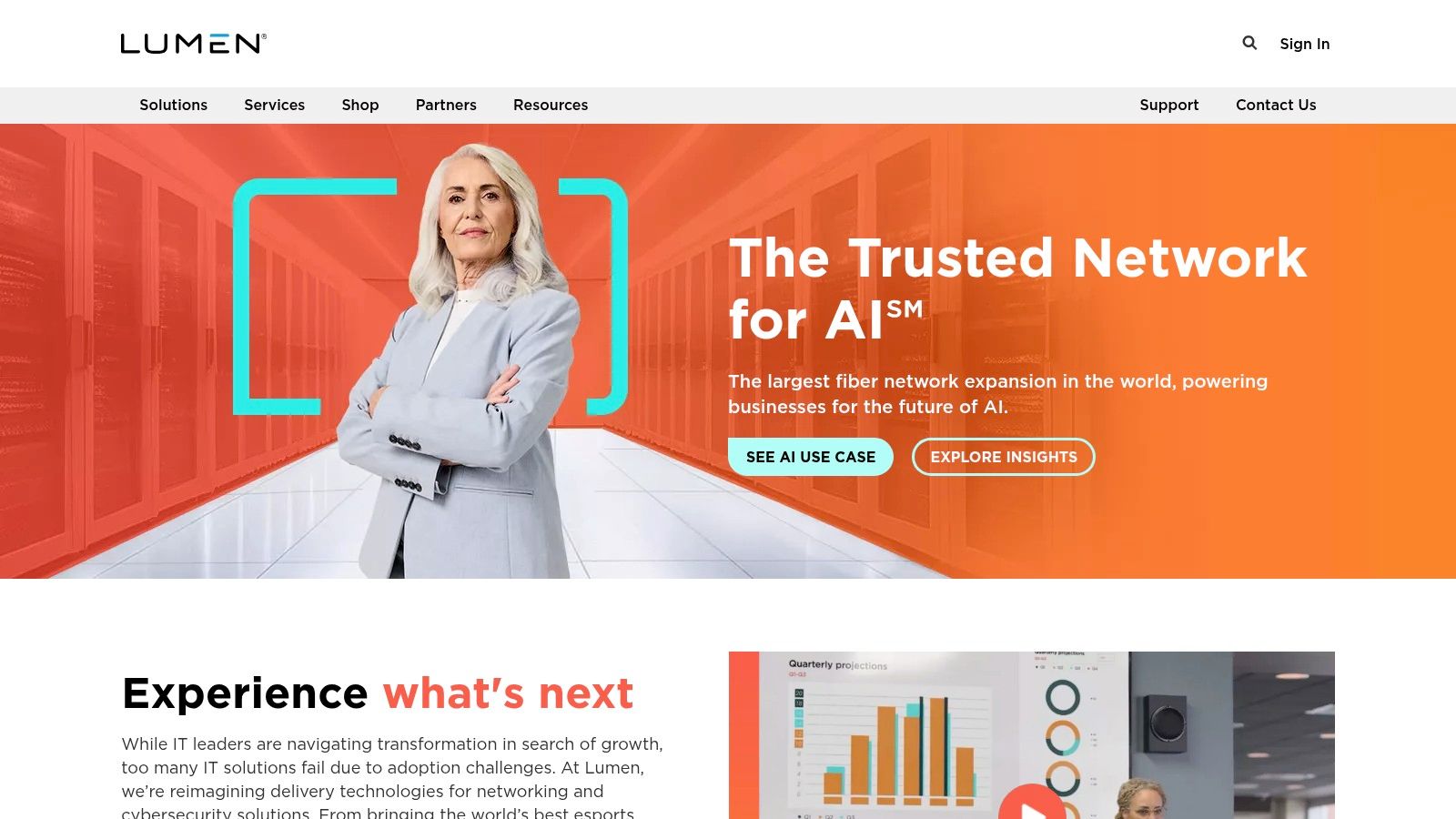
This contract-free approach provides unparalleled freedom, allowing companies to scale or adjust their services as needs change without facing early termination fees. CenturyLink offers both legacy DSL and modern fiber connections with speeds up to 940 Mbps, ensuring there is a viable option for various operational needs and budgets. This makes it a practical choice for businesses located outside major fiber hubs, including many rural operations, that still require a reliable connection for daily tasks.
Key Offerings and User Experience
The CenturyLink Business website prioritizes simplicity. The first and most essential action for any potential customer is to use the address verification tool to see which technology (DSL or fiber) is available at their specific location, as this dictates the speeds and performance they can expect.
Pros:
- No Annual Contract: Offers excellent flexibility, allowing businesses to cancel or change plans without penalty.
- Affordable Pricing: Plans are competitively priced, making it an accessible option for small businesses and startups.
- Multiple Connection Types: The availability of both DSL and fiber provides broader coverage, including in some rural areas.
Cons:
- Inconsistent Speeds: DSL performance can be significantly lower than advertised fiber speeds and may vary by location.
- Limited Fiber Availability: High-speed fiber is not as widespread as their DSL network, limiting access for many.
For businesses operating in less-connected regions, CenturyLink is often a go-to provider. To see how it stacks up against other options, you can review this guide on top rural internet providers to ensure you're making the most informed decision. If month-to-month flexibility is your top priority, CenturyLink is a strong contender.
9. Viasat Business
Viasat Business carves out a crucial niche among the best business internet providers by delivering reliable satellite internet to locations that terrestrial services simply cannot reach. Its website, viasat.com/business, serves as a vital portal for rural, remote, and mobile businesses needing a dependable connection. The platform’s standout feature is its near-universal nationwide availability, ensuring that operations in underserved areas are not left offline.
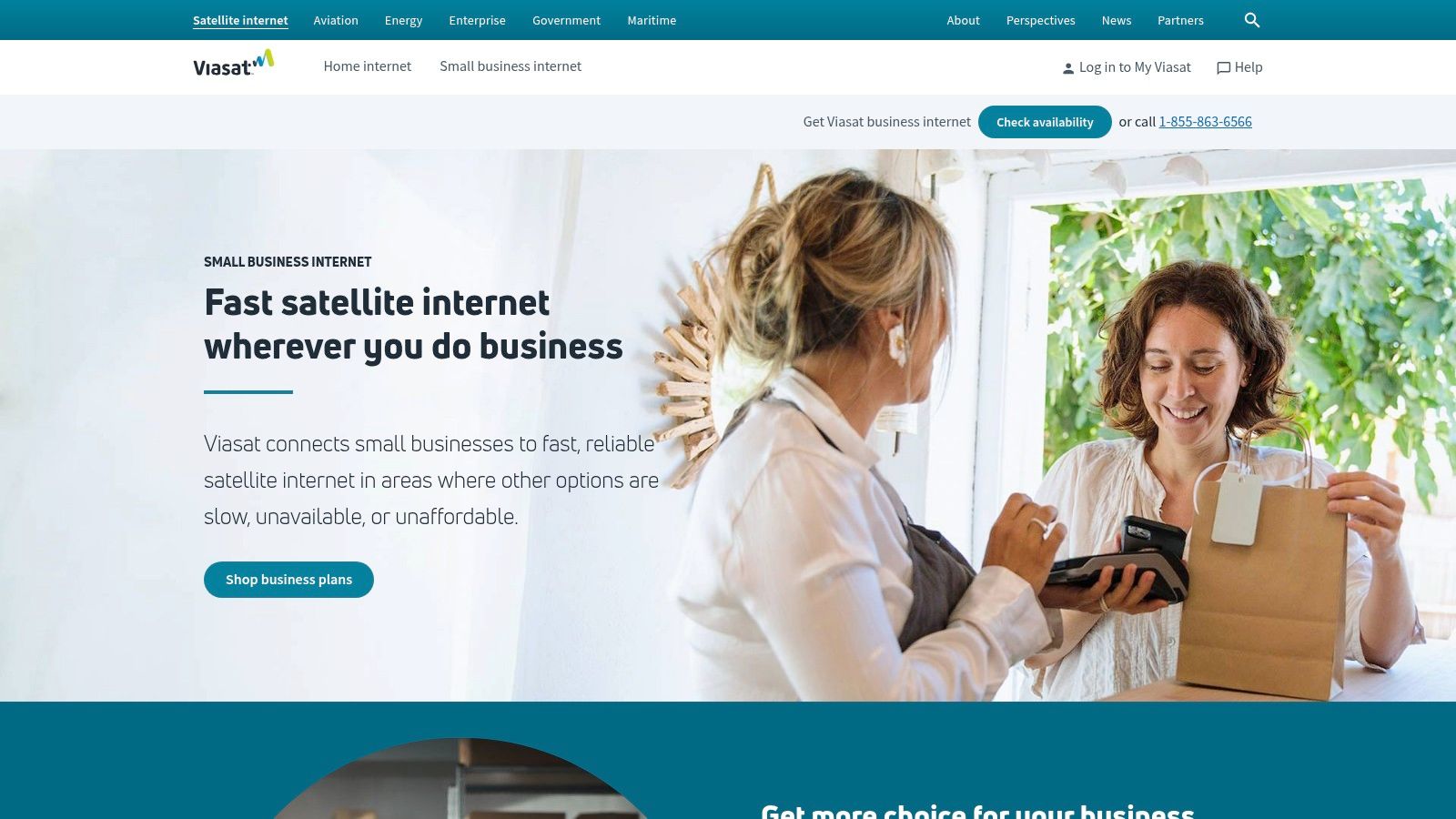
This extensive coverage makes Viasat an essential service for industries like agriculture, construction, and event management in remote locales, as well as for RV-based professionals who need consistent internet access far from urban centers. While speeds top out at 100 Mbps, the service is more than capable of handling point-of-sale systems, email, and standard web browsing. The website clearly outlines its plan structures, highlighting the inclusion of free static IP addresses-a significant perk for businesses that need to host servers or secure remote access.
Key Offerings and User Experience
The Viasat Business website prioritizes getting users connected quickly. The primary call to action is to check availability and get a quote, reflecting its focus on customized solutions for unique locations.
Pros:
- Wide Availability: Service is accessible virtually anywhere in the U.S., making it ideal for rural and hard-to-reach business locations.
- Flexible Contract Options: Viasat offers both contract and contract-free plans, providing businesses with greater flexibility.
- Free Static IP Addresses: A valuable feature included at no extra cost, essential for specific business networking needs.
Cons:
- Higher Latency: As a satellite service, it inherently has higher latency than fiber or cable, which can affect real-time applications like video conferencing.
- Slower Speeds: Maximum speeds are lower than what most terrestrial providers offer, making it less suitable for data-heavy operations.
For businesses operating beyond the reach of traditional broadband, Viasat provides a lifeline. It proves that a reliable connection is possible no matter the location, making it an indispensable option for a specific but critical segment of the market.
10. HughesNet Business
HughesNet Business carves out its essential niche among the best business internet providers by serving those who have no other options. Its website, business.hughesnet.com, is a lifeline for businesses in remote or rural locations where fiber, cable, and even reliable 5G are unavailable. The platform’s core value proposition is simple: nationwide satellite internet access, ensuring that even the most isolated ventures can stay connected.
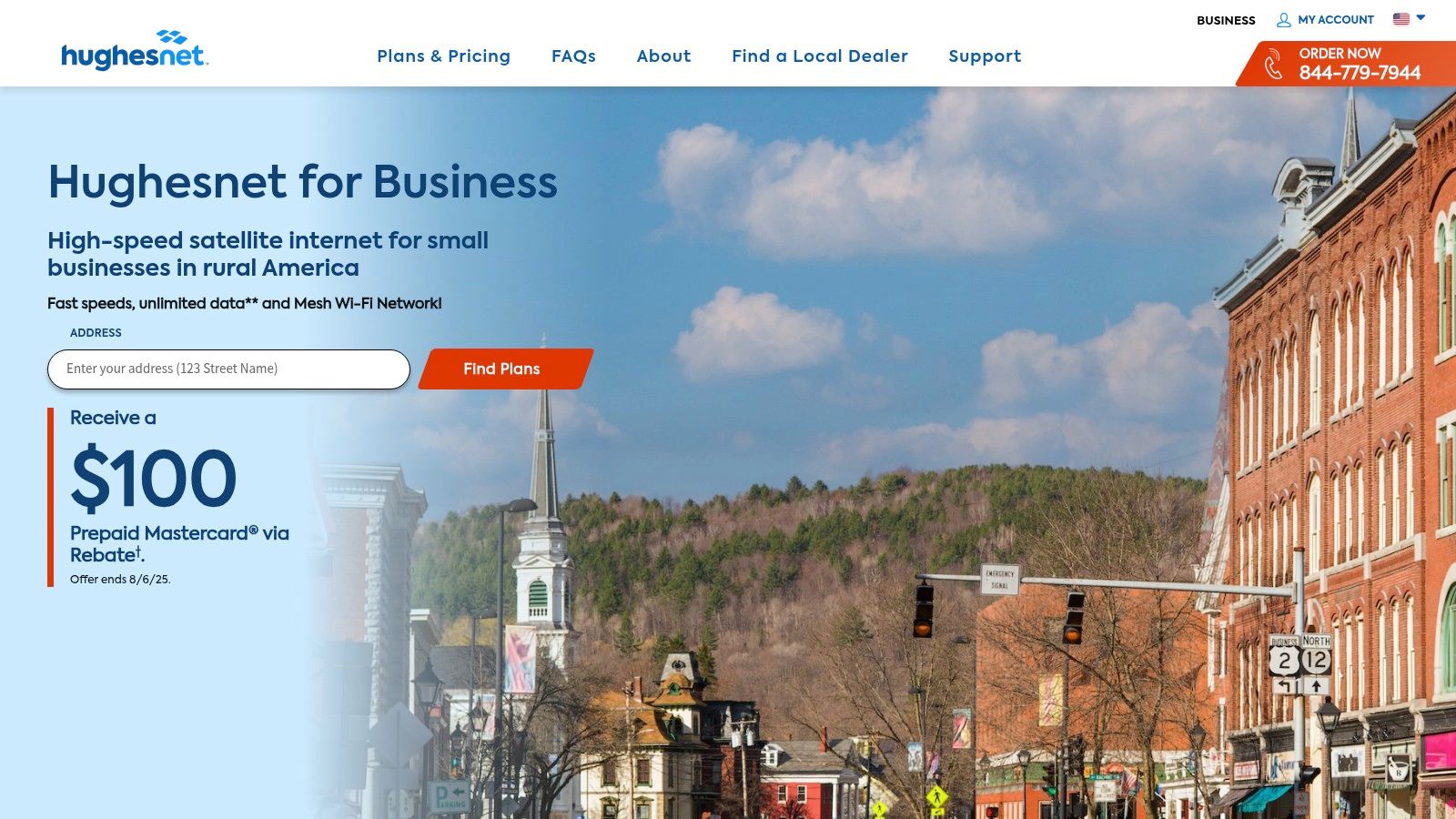
While speeds are capped at 25 Mbps, this is often sufficient for essential operations like processing credit card payments, sending emails, and basic web browsing. This makes HughesNet a practical solution for agricultural businesses, remote construction sites, or rural storefronts that would otherwise be offline. The website clearly details its plans, which all feature unlimited data without hard caps, a critical feature for businesses that cannot afford to be cut off mid-month.
Key Offerings and User Experience
The HughesNet Business site guides users directly to its plan offerings and an availability check, which is more of a formality given its nationwide coverage. The primary differentiator between plans is the amount of priority data, not the speed.
Pros:
- Universal Availability: Service is accessible virtually anywhere in the U.S. with a clear view of the southern sky.
- No Hard Data Limits: Your connection is never shut off, although speeds may be reduced after using your priority data allowance.
- Free Standard Installation: This removes a significant upfront cost and barrier to entry for many small businesses.
Cons:
- High Latency: The nature of satellite technology results in significant delays (latency), making it unsuitable for real-time applications like VoIP or fast-paced online gaming.
- Slower Speeds: The 25 Mbps maximum speed is significantly lower than terrestrial alternatives and can be a bottleneck for data-heavy tasks.
For any business located outside traditional service areas, HughesNet is not just an option; it's often the only one. It provides a foundational level of connectivity that keeps the doors open.
11. Google Fiber Business
Google Fiber Business carves out its niche among the best business internet providers by championing simplicity, raw speed, and unparalleled customer satisfaction. Its website, fiber.google.com/business, mirrors this philosophy with a clean, minimalist design that prioritizes transparent pricing and straightforward plan selection. The standout feature is its commitment to symmetrical gigabit speeds without the usual industry annoyances like hidden fees, data caps, or annual contracts.
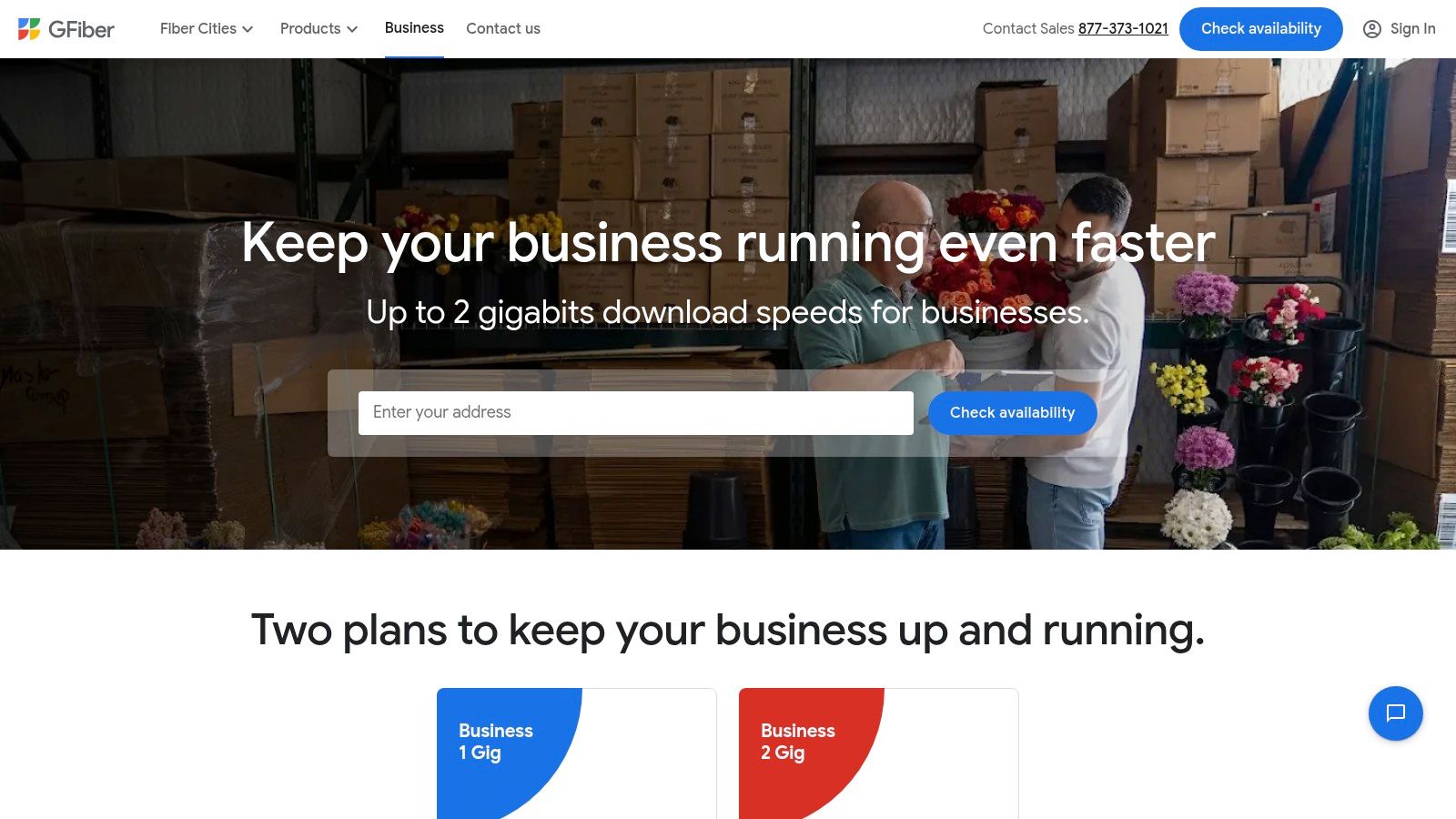
This straightforward, high-performance approach is ideal for small to medium-sized businesses that cannot afford downtime or sluggish uploads. For companies in creative fields, software development, or any operation that handles large datasets, Google Fiber’s symmetrical 2 Gbps plan can be transformative. The website makes it incredibly easy for users to check availability, compare the one or two simple plans offered, and understand exactly what they will pay each month, a refreshing change from the convoluted pricing structures common elsewhere.
Key Offerings and User Experience
The Google Fiber Business website is exceptionally user-friendly. The address lookup tool is front and center, as confirming serviceability is the single most important, and often disappointing, step for potential customers.
Pros:
- Extreme Simplicity: Transparent, flat-rate pricing with no contracts or data caps removes administrative headaches.
- High-Speed Symmetrical Fiber: Blazing-fast speeds for both uploads and downloads are perfect for data-heavy operations.
- Excellent Customer Support: Known for high customer satisfaction ratings, which is a rare feat in the ISP industry.
Cons:
- Extremely Limited Availability: The service is only available in a handful of metropolitan areas, making it inaccessible for most businesses, especially rural ones.
- Fewer Business-Grade Add-Ons: Lacks the extensive suite of enterprise features like dedicated lines or complex networking solutions offered by larger incumbents.
For those lucky enough to be within its small service footprint, Google Fiber offers a top-tier, hassle-free internet experience.
12. Lumen
Lumen earns its place among the best business internet providers by targeting large enterprises and organizations with mission-critical connectivity needs. The website, lumen.com, serves as a portal into a world of high-capacity networking solutions, moving beyond standard business internet to offer Dedicated Internet Access (DIA) and high-speed IP transit. Its standout offering is the sheer scale of its service, with dedicated connections scaling up to 100 Gbps.
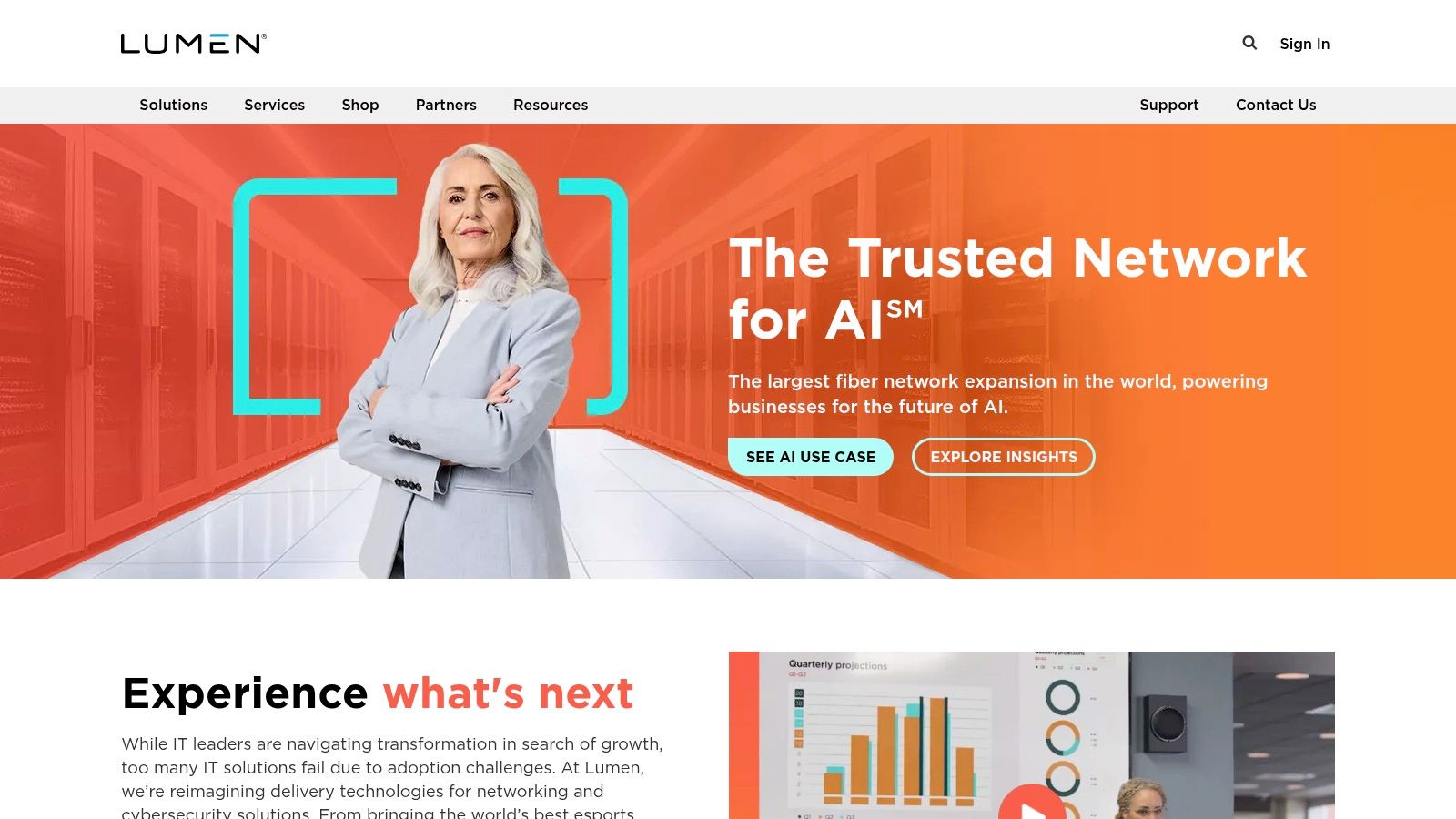
This level of performance is essential for large corporations, data centers, and global enterprises that require an unwavering, private line to the internet backbone. Lumen's emphasis on comprehensive Service Level Agreements (SLAs) guarantees uptime, latency, and packet delivery, providing the assurance needed for operations where any downtime means significant financial loss. The site details advanced security options, including robust DDoS mitigation and managed network services, making it a one-stop shop for enterprise-grade infrastructure.
Key Offerings and User Experience
Exploring Lumen's website reveals a focus on customized, solution-based sales rather than simple off-the-shelf plans. Prospective customers will use the site to understand capabilities and initiate contact with a sales team to architect a specific solution.
Pros:
- Enterprise-Grade Performance: Dedicated connections and massive bandwidth support the most demanding digital operations.
- Comprehensive SLAs: Strong guarantees on network performance offer peace of mind for critical applications.
- Advanced Security: Integrated security features like DDoS protection are vital for protecting corporate assets.
Cons:
- Premium Cost: Pricing is significantly higher and tailored to enterprise budgets, not small or medium-sized businesses.
- Overkill for SMBs: The services are far more complex and powerful than what a typical small business or remote worker would need.
Lumen is not for the average business but is an indispensable partner for large-scale operations requiring guaranteed, high-capacity connectivity. Its services are built for entities that form the backbone of the digital economy.
Top 12 Business Internet Providers Comparison
| Provider | Core Features / Speeds | User Experience / Quality ★ | Value / Price 💰 | Target Audience 👥 | Unique Selling Points ✨ |
|---|---|---|---|---|---|
| 🏆 SwiftNet Wifi | 5G high-speed internet for rural & RV areas | Reliable in remote zones ★★★★ | Pricing on inquiry 💰 | Rural residents, RV travelers 👥 | Tailored 5G for underserved locations ✨ |
| AT&T Business | Fiber up to 5 Gbps, symmetrical speeds | 99.9% uptime, strong satisfaction ★★★★ | Higher cost 💰 | Businesses of all sizes 👥 | No contracts fiber, security suite ✨ |
| Verizon Business | Fiber up to 940 Mbps + 5G wireless | Reliable, 24/7 support ★★★★ | Mid to high 💰 | Mobile & enterprise businesses 👥 | 5G Business Internet, contract buyout ✨ |
| Comcast Business | Cable up to 1.25 Gbps, unlimited data | 24/7 priority support ★★★★ | Higher cost, 2-year contract 💰 | Large enterprises 👥 | Wireless backup, guest WiFi ✨ |
| Spectrum Business | Cable up to 1 Gbps, no contracts | Flexible, wide availability ★★★ | Moderate to high 💰 | Growing businesses 👥 | Bundled phone/TV, no contract ✨ |
| EarthLink Business | Fiber up to 5 Gbps, no data caps | High customer satisfaction ★★★★ | Affordable 💰 | Cost-conscious businesses 👥 | Transparent pricing, no caps ✨ |
| Frontier Business | Fiber up to 7 Gbps, no annual contract | Mixed ratings ★★★ | Affordable 💰 | Small to medium businesses 👥 | No contract, included equipment ✨ |
| CenturyLink Business | DSL & fiber up to 940 Mbps, no contracts | 24/7 support, affordable ★★★ | Affordable 💰 | Flexible business needs 👥 | No contracts, multiple connection types ✨ |
| Viasat Business | Satellite up to 100 Mbps | Wide coverage, limited speed ★★ | Moderate 💰 | Rural & remote businesses 👥 | Nationwide satellite, static IPs included ✨ |
| HughesNet Business | Satellite up to 25 Mbps, no data limits | Available nationwide ★★ | Moderate 💰 | Remote areas lacking broadband 👥 | No hard data caps, free installation ✨ |
| Google Fiber Business | Fiber up to 2 Gbps, no contracts | Excellent satisfaction ★★★★ | Higher cost 💰 | Businesses valuing simplicity 👥 | Transparent pricing, no contracts ✨ |
| Lumen | Dedicated up to 100 Gbps, IP up to 400 Gbps | Enterprise-level SLAs & security ★★★★ | High cost 💰 | Large enterprises 👥 | Advanced security, managed services ✨ |
Making the Final Connection for Your Business
Navigating the landscape of the best business internet providers can feel like mapping an uncharted territory, especially when your business operates outside conventional urban centers. We've explored a dozen top contenders, from the fiber-optic speed demons like Google Fiber and AT&T Business to the satellite stalwarts like Viasat and HughesNet. The central theme is clear: there is no single "best" provider, only the one that is best for your unique operational context.
Your final decision hinges on a careful evaluation of your specific needs against the strengths and weaknesses of each service. The allure of gigabit speeds from fiber is undeniable, but its limited availability makes it a non-starter for many rural businesses and virtually all mobile operations. This is where the modern connectivity puzzle gets interesting and requires a more strategic approach.
Key Takeaways and Decision-Making Framework
To simplify your choice, let's distill our findings into a practical framework. Your selection process should be a methodical assessment of several core factors, not just a race for the highest advertised speed.
- Geographic Reality is Paramount: Your physical location is the most significant filter. Before you fall in love with a provider's marketing, use their availability tools to confirm service at your address. For RV-based businesses or those in remote rural zones, this step immediately narrows the field to specialized 5G/LTE providers like SwiftNet Wifi or satellite services.
- Speed vs. Reliability: While intertwined, these are distinct considerations. A fiber connection from Lumen or Spectrum might offer incredible speeds, but is it consistently stable? Conversely, a satellite connection from HughesNet offers broad coverage but is susceptible to latency and weather disruptions, impacting real-time applications like video conferencing.
- Understand the "Business" Difference: Business plans are more than just faster home internet. They come with critical features like Service Level Agreements (SLAs) that guarantee uptime, dedicated customer support channels, static IP addresses for hosting servers, and often, enhanced security features. Do not underestimate the value of these business-centric perks when comparing costs.
- Mobile and Rural Operations Demand Flexibility: For the modern remote worker, RVer, or rural entrepreneur, traditional wired solutions are often inadequate. The rise of powerful 5G and LTE cellular networks has been a game-changer. These services offer the portability and broad coverage that cable and fiber cannot, providing a powerful and reliable connection in places previously considered "off-grid."
Actionable Next Steps for Implementation
Once you've narrowed your list to two or three potential providers, it's time to move from research to action.
- Request a Custom Quote: Published prices are often starting points. Contact the sales departments directly to discuss your specific needs, such as the number of users, required bandwidth, and any special features like static IPs. This can sometimes unlock better deals or customized packages.
- Drill Down on Contract Terms: Scrutinize the fine print. Look for hidden fees, data caps (especially with satellite and some cellular plans), early termination fees, and equipment rental costs. A low monthly price can be misleading if the total cost of ownership is high.
- Plan for Installation and Setup: Inquire about the installation process. Is it self-setup, or does it require a professional technician? What is the typical lead time from signing the contract to being online? For a mobile solution like an RV setup, confirm the ease of activating and pausing service as your location changes.
Choosing from the best business internet providers is a foundational investment in your company's future. It's the digital highway that connects you to your customers, collaborators, and opportunities. By moving beyond a simple comparison of price and speed and instead focusing on reliability, flexibility, and support tailored to your unique circumstances, you can secure a connection that not only meets today's demands but also empowers your growth for years to come.
Ready to break free from the limitations of traditional internet? If your business is on the move, located in a rural area, or simply needs a reliable, high-speed connection without the wires, SwiftNet Wifi offers powerful 5G and LTE solutions designed for you. Discover how our flexible, contract-free plans can power your enterprise by visiting SwiftNet Wifi today.

